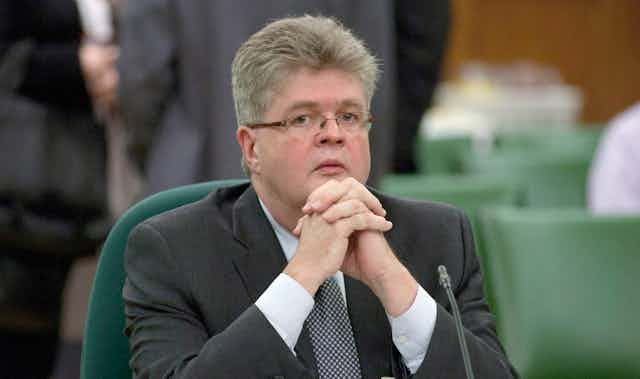The SNC-Lavalin controversy dogged Prime Minister Justin Trudeau in the leadup to the Canadian federal election.
In his August report on the SNC-Lavalin case, Ethics Commissioner Mario Dion made strong assertions about the meanings intended by Michael Wernick, former clerk of the Privy Council, during a 17-minute telephone conversation with Jody Wilson-Raybould that was secretly recorded in December 2018.
Dion’s report provided no analysis to support his assertions that the call between Wernick and Wilson-Raybould, the former attorney general and justice minister, was evidence of inappropriate pressure being placed on her to grant SNC-Lavalin a deferred prosecution agreement.
The conversation must be systematically assessed to provide the fairest possible perspective on the recording.

Wilson-Raybould covertly recorded the conversation and then publicly released it in March 2019. Dion asserted that the conversation was the “most flagrant attempt to influence Ms. Wilson-Raybould” and that “it is evident” that Wernick was attempting to persuade her to overrule a prior decision on SNC-Lavalin by the director of public prosecutions, Kathleen Roussel.
Prior to the public release of the recording, Wernick denied to the House of Commons Justice Committee that he had threatened Wilson-Raybould and pressured her to overrule the director’s decision.
Does an examination of the conversation determine whether Dion’s interpretations are “evident” and whether either of these opposing claims is persuasively supported?
Extensive miscommunication
As language academics, our analysis has revealed that the conversation included substantial miscommunication.
The characteristics of conversation are explained in Angeliki Tzanne’s book Talking at Cross-Purposes: The Dynamics of Miscommunication and provide some guidance in analyzing Wernick’s talk with Wilson-Raybould.
The two officials expressed different meanings with the word “tool,” and even with pronouns like “it” and “this.” They also frequently shifted topics. On two occasions, Wernick unsuccessfully attempted to repair misunderstandings by saying “people are talking past each other.” The many pauses, hesitation markers (“um” and “uh”), repetitions and reformulations indicate that this spoken conversation was very different from a planned and edited written text.
The misunderstandings may suggest that Wilson-Raybould anticipated and then interpreted the sentences to mean overruling the director of public prosecutions, but that Wernick did not actually intend those meanings.
‘Get it done’
Of particular concern is Wernick’s use of the phrase “get it done” (ellipticals indicate pauses):
“So the PM … (um) wants to be able to say … (um) that he has tried everything he can … (uh) you know within within a legitimate toolbox to try to head that off … (um) so he he is … quite determined (laughs) quite firm … (uh) but he wants he wants to know why the DPA [deferred prosecution agreement] route which Parliament provided for … isn’t being used … and I think he is gonna find a way to get it done one way or another.”
Dion appears to have concluded that “it” referred to overruling the director of public prosecutions. However, the context suggests an alternative and potentially more plausible intended meaning.
Four legal tools within the attorney general’s “toolbox” were discussed: a deferred prosecution agreement for SNC-Lavalin, overruling Roussel’s decision, obtaining information about the director’s rationale and seeking external legal advice.
The content and structure of the conversation show that the legal tool Wernick focused on was obtaining information from the director of public prosecutions regarding why a deferred prosecution agreement was not being employed.
This information was explained in a notice written by the director.
In early September 2018, that notice was forwarded from Wilson-Raybould’s office to the Prime Minister’s Office. But a key fact omitted from Dion’s report is that the notice was misplaced and never received. As Wilson-Raybould indicated in the recording, since at least Nov. 22, 2018, she had been aware that the PMO did not have the notice, but had not remedied this situation by resending it.
Requesting the notice
In Wernick’s sentence that preceded “get it done,” the main verb was “wants (to know why).” At the beginning of the conversation, Wernick twice stated that one of his goals was to find out why the deferred prosecution agreement was not being proposed. Within the conversation, almost half of his mentions of legal tools were about finding out why the deferred prosecution agreement was not being proposed.
Wernick continued with the conversation until Wilson-Raybould agreed to resend the notice. With respect to this goal, Wernick “got it done” by the end of the conversation.
Our general conclusion is that the discussion between Wernick and Wilson-Raybould contained so much miscommunication that it does not constitute persuasive evidence about alleged threats to the former attorney general.
Because he did not produce a systematic analysis of the full conversation, Dion’s strong assertions are not supported by evidence.
[ You’re smart and curious about the world. So are The Conversation’s authors and editors. You can read us daily by subscribing to our newsletter. ]

